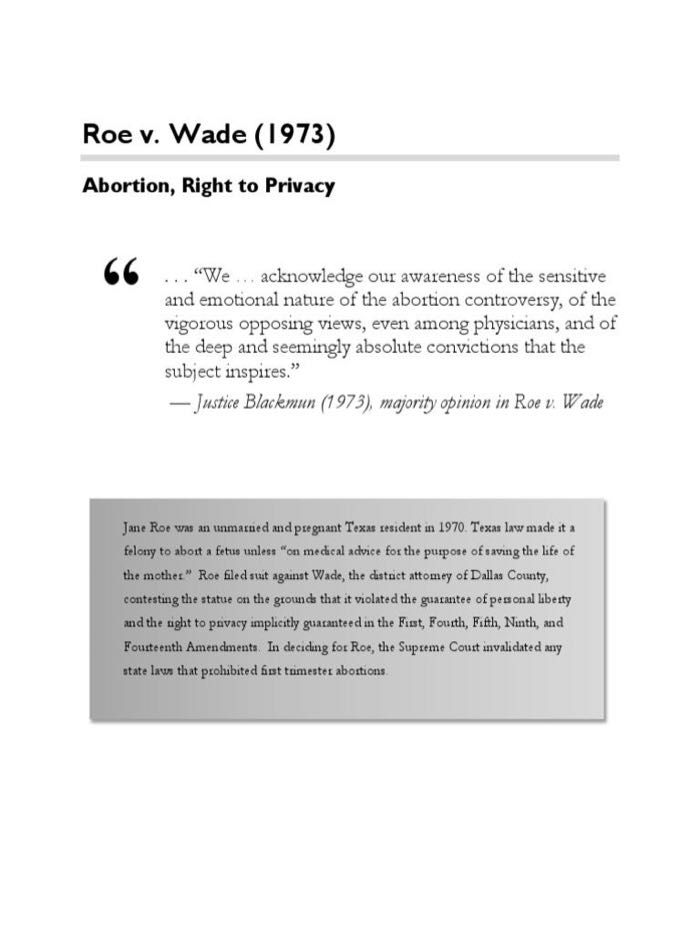Roe v. Wade
Reviewed date: 2021 Jul 26
40 pages
The opinion is short and poorly decided. Most of the opinion explores the history of abortion and abortion laws, then it jumps off the rails and legislates. I agree with Justice Rehnquist's dissent that what the Court has done in the opinion is "more appropriate to a legislative judgment than to a judicial one."
Personhood in the Constitution
I am pleased to note that Justice Blackmun's opinion takes up the question of personhood and examines the Constitution to see whether that document defines "person" and whether that definition includes the unborn. That is a crucial question. Unfortunately, the Constitution refers to "person" but does not define the term. Further, one of those references talks about "persons born or naturalized in the United States," and all other references are clearly to persons already born. Constitutionally, "person" does not explicitly include the unborn. There is a flaw in our Constitution.
Unfortunately, Blackmun seems to presume that the failure to Constitutionally define "person" means that the legislature cannot set that definition. He traces the development of societal attitudes towards abortion from antiquity to English common law and to American law. What he sees is a general acceptance of abortion prior to quickening, and then a recent (within the prior century) trend within America toward a complete ban on the practice. From this, he deduces that the recent laws banning abortion have no basis in historical precedent, so he finds them unconstitutional.
However, what he should have done is see that, as scientific progress gave humans a better understanding of the processes of fetal development, public sentiment and the law changed accordingly. It is right and proper that the legislature should act to protect human life, even unborn life. It is not the Court's prerogative to second-guess the legislature in these matters.
Right to privacy
Justice Blackmun's opinion talks a lot about the right to privacy, but again I must refer to Rehnquist's dissent: the so-called right to privacy has nothing to do with privacy as commonly understood. It's a confusing and misleading choice of terminology. Being generous, Rehnquist suggests that what Blackmun is really trying to get at is that "the claim of a person to be free from unwanted state regulation of consensual transactions may be a form of 'liberty' protected by the Fourteenth Amendment." Rehnquist is able to express clearly and concisely in one sentence what Blackmun spent seven paragraphs obfuscating. I'm not impressed with Blackmun.
Now we're just making stuff up
As muddled and confusing as Blackmun's opinion has been, the rule he invents is even more bizarre. He decides, all by himself apparently, that a) the state cannot regulate abortion during the first trimester, b) the state can regulate abortion in the second trimester for the purposes of protecting the mother's health, and c) the state can regulate or entirely ban abortion in the third trimester on the grounds of protecting the potential human life of the unborn. Why Justice Blackmun gets to decide this is beyond me. If there are questions about the status and value of the pre-born child, that is surely for the people to decide through the legislature. If the Court wants to weigh in and protect the rights of the unborn, or of the mother, then the Court must determine--as a matter of law--whether the unborn is a person. Blackmun's opinion declines to make that determination, and so I don't see any reasonable way for him to reach the conclusion that the Court can then decide to second-guess and overrule the legislature.
Overturn Roe v. Wade?
The Court's opinion was wrong. I don't, however, wish for a simple overturning of the decision. What I pray for is a Court that will make the determination that Blackmun refused to make: that the as-yet-unborn child is a person, and that, as a person, the child must be given the full rights and protections of any other human being under the law. This would go far beyond simply overturning the Court's opinion on Roe v. Wade. It would have implications not just for abortion but also for fetal stem cell research, in-vitro fertilization, and some forms of birth control. It would be unpopular. It would, however, be morally, ethically, and scientifically consistent with what we know about human biology.
At the very least, though, we might hope that the decision is overturned and the law reverts to the prior status quo. The people of each state, through their legislature, can determine for themselves what the legal status of the unborn is, and make laws to protect those unborn persons without Court interference. I'm afraid, through, that a situation like that would run afoul of the Equal Protection Clause, bringing the Court right back into it--this time with a better-reasoned opinion.
